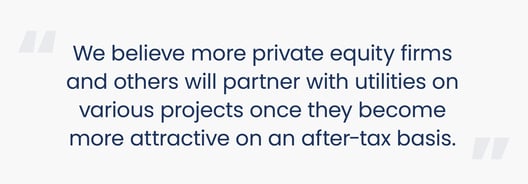When it comes to tax policy, Uncle Sam giveth and taketh — but usually the latter, as most taxpayers know all too well. The recently signed Inflation Reduction Act, or IRA, is no exception. The new law effectively creates a 15% alternative minimum tax on corporations with more than $1 billion in average financial statement income.
 Other provisions of the law, however, offer some potential positives that we believe utilities and utility investors are likely to find appealing. For one, the law permits financial statement income to be reduced by physical property deductions. Regulated utilities, which are capital-intensive corporations, make use of the tax code’s accelerated depreciation schedules. Those provisions are retained under the new law, enabling utilities to substantially reduce income subject to the new tax.
Other provisions of the law, however, offer some potential positives that we believe utilities and utility investors are likely to find appealing. For one, the law permits financial statement income to be reduced by physical property deductions. Regulated utilities, which are capital-intensive corporations, make use of the tax code’s accelerated depreciation schedules. Those provisions are retained under the new law, enabling utilities to substantially reduce income subject to the new tax.
The IRA also restores to full value and extends the Investment Tax Credit and the Production Tax Credit for clean energy projects and creates a credit for standalone storage. The extension eliminates uncertainty about these provisions well into the 2030s. The credits will encourage the development of wind, solar and other renewable energy sources, which we believe should help keep rates down for utility customers, help utility companies prepare for the future, and make the transition to clean energy faster and less expensive.
The new law also will enable companies involved in the transition process to transfer tax credits they earn, which previously wasn’t possible. This greater flexibility is likely to attract outside capital to the business, which will make the development of new, cleaner generating capacity less expensive. We believe more private equity firms and others will partner with utilities on various projects once they become more attractive on an after-tax basis.
At a time of rising inflation and higher fuel costs, it’s worth repeating the findings of Resources for the Future, a Washington-based non-profit research group. Their models found that the new law’s effect on the U.S. power sector will result in retail electricity costs that could decline 5% to 7% over the next decade compared to a scenario without the new law. That would save consumers between $209 billion and $278 billion.1
When all its provisions are taken into account, we believe the new IRA law turns out to be a win for utilities, utility investors and utility customers.
Have the stock market’s turmoil and falling bond prices caused you to worry about retirement income? Perhaps it’s time to consider a utility fund.



